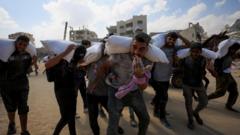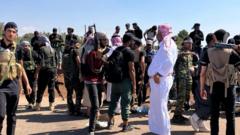The UK and 27 other nations have urgently called for an immediate ceasefire in Gaza, citing alarming levels of civilian suffering as Israeli military actions continue amidst dire conditions. In a joint statement, they criticize Israel’s aid delivery methodology and express shock over reports of civilian deaths, especially children, who are seeking basic necessities such as food and water. The coalition emphasizes that violent and dangerous tactics must end to prevent further tragedies in the beleaguered region.
UK and 27 Nations Demand Immediate Action to Protect Gaza Civilians

UK and 27 Nations Demand Immediate Action to Protect Gaza Civilians
A coalition of 28 countries, including the UK, has issued a stern condemnation of Israel amid the escalating humanitarian crisis in Gaza.
As the humanitarian crisis in Gaza intensifies, an alliance of 28 countries, led by the UK, has publicly condemned Israel's military actions and the dire conditions facing civilians. They demand an immediate ceasefire, calling for a reevaluation of Israel's aid delivery protocol, which they argue exacerbates the suffering. With reports highlighting the death of numerous civilians, including children seeking food, the international community is pressing for peace and humanitarian relief.
Gaza has been gripped by a humanitarian crisis, drawing international criticism towards Israel for its military tactics and aid distribution strategies. Over the past weekend, alarming reports indicated that more than 100 Palestinians were killed while attempting to secure food and water, further escalating calls for a ceasefire from a coalition of 28 countries, including the UK. The coalition's statement condemns the "inhumane killing" of civilians, asserting that the situation in Gaza has reached catastrophic levels, with food scarcity and malnutrition claiming lives, particularly among vulnerable populations like children and pregnant women.
The UK Foreign Secretary, David Lammy, highlighted the mounting challenges in Gaza, announcing additional humanitarian aid while supporting Israel's right to exist. He stressed that the ongoing actions are damaging Israel's international standing and long-term security. The United Nations has also expressed concern over worsening conditions, stating that the "last lifelines" for Gaza residents are collapsing. While Israel's actions have faced scrutiny, the Israeli government maintains that Hamas is primarily responsible for the ongoing conflict and suffering.
The grave humanitarian conditions have prompted various nations to reconsider their positions on diplomatic resolutions, with calls for a political pathway towards lasting peace. However, ongoing violence and accusations of misinformation have created a complex and volatile environment in Gaza, with both humanitarian organizations and governments grappling to navigate the crisis. As aid agencies face operational challenges, the international community is urged to step up efforts to avert further catastrophe.
Gaza has been gripped by a humanitarian crisis, drawing international criticism towards Israel for its military tactics and aid distribution strategies. Over the past weekend, alarming reports indicated that more than 100 Palestinians were killed while attempting to secure food and water, further escalating calls for a ceasefire from a coalition of 28 countries, including the UK. The coalition's statement condemns the "inhumane killing" of civilians, asserting that the situation in Gaza has reached catastrophic levels, with food scarcity and malnutrition claiming lives, particularly among vulnerable populations like children and pregnant women.
The UK Foreign Secretary, David Lammy, highlighted the mounting challenges in Gaza, announcing additional humanitarian aid while supporting Israel's right to exist. He stressed that the ongoing actions are damaging Israel's international standing and long-term security. The United Nations has also expressed concern over worsening conditions, stating that the "last lifelines" for Gaza residents are collapsing. While Israel's actions have faced scrutiny, the Israeli government maintains that Hamas is primarily responsible for the ongoing conflict and suffering.
The grave humanitarian conditions have prompted various nations to reconsider their positions on diplomatic resolutions, with calls for a political pathway towards lasting peace. However, ongoing violence and accusations of misinformation have created a complex and volatile environment in Gaza, with both humanitarian organizations and governments grappling to navigate the crisis. As aid agencies face operational challenges, the international community is urged to step up efforts to avert further catastrophe.





















